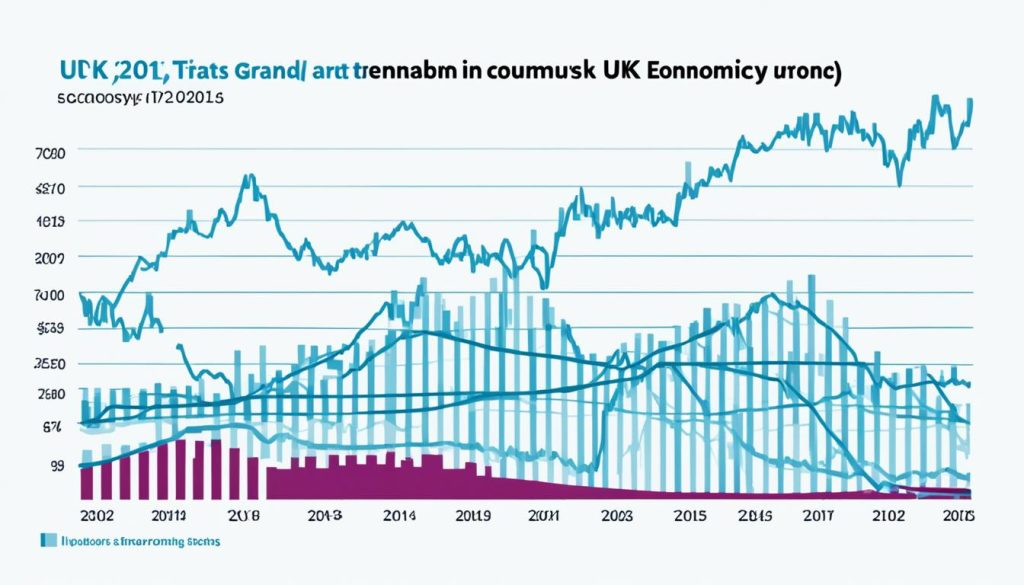Success in the British market needs an understanding of its business culture. This culture appreciates manners, discipline, and being on time. Decisions in companies follow a set order but respect everyone’s input.
Building personal connections is crucial for lasting success. Before meeting in person, many prefer to communicate via email. Timekeeping is taken seriously in the UK.
A handshake is the usual way to say hello in business settings. You should dress formally for meetings. These often begin with casual conversation. It’s also important to support your points with solid data.
Key Takeaways:
- Understanding British business culture is crucial for success in the UK market.
- Politeness, discipline, and punctuality are highly valued in British business.
- Building personal relationships and networking contribute to long-term success.
- Communication is often done through email before face-to-face meetings.
- Being punctual and adhering to formal business attire is important.
Business Etiquette in the UK

In the UK, how you conduct business is crucial. The focus is on professionalism, politeness, and respect. These are observed in all business dealings.
Being clear and precise is key in UK business talks. You need to share your ideas in a clear, brief way. Building trust through networking is also crucial. It leads to lasting success in the UK’s business world.
Decisions in the UK are usually made following a set order. Knowing who does what in a company helps with working together. Adapting to this and being diplomatic can help you succeed.
Keeping a balance between work and personal life is important in the UK. Respecting personal boundaries helps keep everyone productive and happy. It shows you care about a positive work-life balance.
Dressing right, being on time, and following meeting rules are expected. Wear professional clothes for the situation. Always be on time to show respect. Starting meetings with light conversation helps build connections.
Being open to different cultures is essential. Valuing everyone’s background creates a welcoming space. It makes the business environment better, boosting teamwork and new ideas.
The UK business scene values both professional and personal life deeply. Adapting to their ways can help you do well in the UK market.
Key Aspects of Business Etiquette in the UK
| Aspect | Description |
|---|---|
| Communication | Clarity, precision, and politeness in communication |
| Relationship-Building | Importance of networking and building trust |
| Decision-Making | Hierarchical structure and consensus-building |
| Work-Life Balance | Valuing personal time and boundaries |
| Dress Code | Adhering to professional attire |
| Cultural Sensitivity | Appreciating diversity and inclusivity |
Challenges Faced by British Business Owners

British business owners tackle many challenges today. A recent survey highlights difficulties like getting new business, dealing with higher operational costs, and finding work-life balance.
Generating new business is a tough task. With strong competition, attracting and retaining customers needs creative marketing and adapting to what consumers want.
Rising costs are a big hurdle too. Owners see rising rents, utility bills, and wages. Keeping a business profitable while managing these costs is hard.
Moreover, balancing work and life is hard for many. The demands of a successful business mean long hours. This can stress and affect personal life and health.
Besides those main issues, there are other hurdles. These include cutting costs, staying updated with tech, managing cash flow, and facing competition.
Finding skilled employees is tricky too. Businesses aim to find and keep talented workers. This helps the business grow and succeed.
Despite these hurdles, British business owners stay positive. They’re determined to overcome these challenges. Through adapting and innovating, they contribute to a thriving UK business scene.
Strategies for Success in UK Business

Success in UK business requires adapting to local customs. These strategies can boost your chances in the British market:
1. Seek Guidance from Local Mentors
Working with local mentors can give you valuable insights. They know the UK business scene well. You can learn about market trends, legal stuff, and UK cultural bits from them.
2. Engage with Professional Networks
It’s key to connect with others in your field. Attend industry events and join forums for partnerships and tips. These activities help you meet others and share knowledge.
3. Embrace Cultural Differences
The UK’s culture is diverse and rich. Respecting this diversity helps in making good business relationships. Show you understand and adapt to local ways to gain trust.
4. Build Strong Relationships
Relationships matter a lot in the UK. Take time to get to know clients and suppliers well. Regular chats, showing real interest, and keeping promises are crucial.
5. Enhance Communication
Being clear in how you talk and write is vital. Make sure you’re understood and listen well. This leads to better teamwork.
6. Demonstrate Respect for Local Customs
Knowing and following UK etiquette is a must. Learn about dress codes and meeting manners. This shows you’re professional and makes a good impression.
7. Recognize the Values of Work-Life Balance, Professionalism, and Networking
Work-life balance, being professional, and networking are prized in the UK. A good work-life balance improves both happiness and work success. Being professional and networking open up new possibilities.
8. Utilize Support from Industry Peers and Professionals
Use the help around you, like from banks and consultants. They can guide you on finance, laws, and strategy. Their advice helps you face challenges wisely.
| Strategies for Success in UK Business | Key Benefits |
|---|---|
| Seeking guidance from local mentors | Gaining valuable insights into the UK business landscape |
| Engaging with professional networks | Establishing strategic partnerships and accessing industry knowledge |
| Embracing cultural differences | Building trust and credibility within the UK business community |
| Building strong relationships | Nurturing long-term partnerships for business growth |
| Enhancing communication | Fostering effective collaboration and avoiding misunderstandings |
| Demonstrating respect for local customs | Creating positive impressions and building professional credibility |
| Recognizing the values of work-life balance, professionalism, and networking | Enhancing personal well-being and maximizing business potential |
| Utilizing support from industry peers and professionals | Accessing expert guidance and resources for informed decision-making |
Using these strategies, you can better navigate UK business culture. They help improve your market success chances.
Impact of Cultural Differences on UK Business Interactions

Cultural differences shape business interactions in the UK. Understanding these differences is key to building strong relationships. It also helps in improving communication and boosting success.
Adapting to UK business culture shows respect and builds credibility. Recognizing the importance of communication styles, hierarchies, and decision-making is essential.
In the UK, balancing work and personal life is valued. Understanding the importance of this balance is key. Following business etiquette, like being punctual and dressing appropriately, is also expected.
Diversity and inclusivity are crucial in UK business culture. By valuing diversity and avoiding stereotypes, a positive environment is created. Inclusivity lets businesses enjoy diverse views and talents.
Benefits of Embracing Cultural Differences in UK Business:
- Enhanced communication and understanding
- Improved relationship-building and trust
- Increased chances of success
- Access to diverse talent and perspectives
- Creation of a positive and inclusive business environment
Challenges in Navigating Cultural Differences:
- Miscommunication due to different communication styles
- Misunderstandings regarding decision-making processes
- Unintentional offense caused by cultural insensitivity
- Difficulty in adapting to unfamiliar business practices
Overview of UK Business Culture
British values and traditions guide the UK’s business scene. In the workplace, being professional, polite, and respectful matters a lot. Clear and kind communication is key too.
Trust and good relationships help in building strong professional bonds. Businesses often have a clear chain of command, making it important to know who’s in charge.
In the UK, balancing work and personal life is crucial. Respecting everyone’s time and space helps to make a happy workplace.
Following etiquette and being aware of cultural norms is vital. By understanding and respecting these principles, you improve your chances of succeeding in the UK’s business world.
Communication Style in UK Business

Understanding UK business communication is key. Clarity and precision are crucial in the UK. Ideas should be expressed clearly and concisely to avoid confusion. Politeness and a hint of indirectness are important too. Balancing clearly expressing oneself while remaining polite helps build positive relationships, avoiding any misunderstandings.
Humor plays a big role in UK business to build rapport. It creates a friendly setting. But, it’s vital to be aware of cultural differences. Use humor carefully and thoughtfully.
Knowing how to interpret direct and indirect messages matters in the UK. Sometimes, people hint at their true thoughts. Spotting these hints is key to understanding the full message.
In UK business talks, humor, subtleness, and clear messages are important. By getting the UK communication style, you can improve relationships, avoid problems, and work better together.
| Key Points |
|---|
| Clarity and precision are valued in UK business communication. |
| Politeness and indirectness play a significant role. |
| Humor is commonly used to build rapport. |
| Understanding both direct and indirect messages is crucial. |
Professional Relationships in UK Business
Building strong relationships is key to success in UK business. The value of personal connections and referrals is huge. These can open new doors and start collaborations.
Investing time in networking is crucial to forge these relationships. Attending industry events and joining networks helps meet potential partners. It’s a valuable way to connect.
A good network offers advice and can lead to recommendations. In the UK, businesses often look for referrals before collaborating. Trust from colleagues makes a big difference.
The Power of Personal Connections
Personal connections matter a lot in UK business culture. Understanding people personally can build trust. This trust makes collaborations more successful.
Finding common interests with contacts can strengthen bonds. This focus on personal ties shows the British emphasis on trust and real alliances.
Enhancing Communication and Collaboration
Open and clear communication builds strong UK professional relationships. Listening well and responding quickly are crucial. It fosters trust and keeps partnerships strong.
When talking to UK partners, being clear and respectful is important. This helps avoid confusion. Professionalism in communication is key to maintaining good relationships.
Investing in Long-Term Success
Professional relationships in the UK need ongoing effort. Keeping in touch and offering help strengthens bonds. Being active in the business community is vital.
Networking and creating personal ties contribute to your network’s growth. This opens new opportunities. It lays the foundation for success in the UK business world.
| Benefits of Strong Professional Relationships in UK Business | How to Cultivate Strong Professional Relationships in the UK |
|---|---|
| 1. Access to new opportunities | 1. Attend industry events and conferences |
| 2. Increased credibility and reputation | 2. Engage in networking activities |
| 3. More referrals and recommendations | 3. Build personal connections |
| 4. Collaborative partnerships | 4. Foster open and transparent communication |
| 5. Support and mentorship | 5. Invest time in nurturing relationships |
Decision-Making Process in UK Business
In UK business, decisions follow a clear hierarchy, emphasizing authority in organizations. Knowing this helps you move through the decision process well. It’s about team agreement, mixing assertiveness with polite discussions.
Knowing how decisions are made is key. It lets you fit into the structure and work well with others. By understanding your role, you’ll connect better with colleagues in line with decision processes.
The Role of Hierarchy in Decision-Making
UK business decisions depend on a set hierarchy. This means those higher up have more say. Such a system allows leaders with more experience to guide decisions.
When discussing decisions, respect for everyone’s position is vital. Honoring this hierarchy builds trust, making decision-making smoother.
Consensus-Building and Collaboration
UK businesses focus on consensus and teamwork. They prefer group input over going it alone. This approach values different viewpoints and builds well-rounded decisions.
To add value in UK business, join in discussions and listen to others. By aiming for agreement, you’ll help create a cooperative atmosphere for decisions.
Striking the Balance: Assertiveness and Diplomacy
In UK decision-making, balancing firmness and politeness is essential. Clearly share your views but do so with respect. This helps avoid conflicts while getting your point across.
Being assertive shows confidence; diplomacy handles differences gently. Mastering both skills helps you influence decisions and keep good relations at work.
| Key Points | Benefits |
|---|---|
| Understanding the hierarchical decision-making structure in UK business | Aligns with established processes and fosters credibility |
| Emphasizing consensus-building and collaboration | Incorporates diverse perspectives and increases overall buy-in |
| Striking a balance between assertiveness and diplomacy | Fosters effective communication and maintains positive relationships |
| Being aware of the decision-making dynamics within an organization | Enables active participation and successful contributions |
Grasping UK business decision-making and using effective strategies eases navigating its complexities. This leads to meaningful contributions and successful business ties.
Work-Life Balance in UK Business
Work-life balance is key in UK business culture. In a busy business world, it’s vital to look after oneself and keep work in check. This balance helps professionals stay focused and respected at work.
Acknowledging work-life balance is crucial for success in the UK. Both bosses and staff see the benefits of balancing work and home life. This results in happier staff, better mental health, and higher work output.
To get this balance right, setting boundaries and managing time well is important. Bosses can help by making the workplace flexible and supportive. This encouragement helps everyone do their best work.
One good way to manage work-life balance is through flexible hours or working from home. This gives staff more control over their time. Also, being open and taking regular breaks fights off stress and keeps people happy.
Companies that value work-life balance see better staff commitment and keep their people longer. When staff feel their work and personal life are both important, they work harder and stay loyal.
Supporting work-life balance helps not just the staff but the whole company. It makes a workplace where everyone is happier and more productive. This is good for the UK economy too.
| Benefits of Work-Life Balance in UK Business | Benefits of Work-Life Balance for Employees |
|---|---|
| Enhanced employee satisfaction and engagement | Reduced stress and increased mental well-being |
| Improved productivity and performance | Opportunity for personal growth and development |
| Increased employee loyalty and retention | Enhanced work-life integration and harmony |
| Positive impact on company culture | Ability to prioritize personal commitments |
Business Etiquette in the UK
When doing business in the UK, it’s important to dress right, be on time, and act correctly in meetings. The British place a lot of value on a professional appearance. This means both how you dress and your punctuality.
In the UK business world, dressing formally and conservatively is the norm. Men should wear suits and women should choose professional outfits like skirts or trousers with blouses or jackets. Your clothes should match what the industry and specific business setting expect.
Being on time is crucial in UK business settings. It shows you respect others’ time and you’re professional. Arriving on time for meetings and appointments sends a strong signal about your reliability and dedication.
Good meeting etiquette is also essential in the UK. Greet people with a firm handshake and look them in the eye. This helps make a strong first impression and builds connections.
Gift-Giving and Business Entertainment
When it comes to giving gifts or entertaining in business, be culturally sensitive and follow local practices. In the UK, giving business gifts isn’t as common. Choose gifts that are thoughtful, not too expensive, and consider the cultural norms and personal tastes.
Business entertaining in the UK usually happens in places like restaurants or meeting rooms. You should follow your British colleagues’ lead during social and drinking events. Remember to drink responsibly and keep a professional behaviour at all times.
| Business Etiquette | UK |
|---|---|
| Dress Code | Formal and conservative attire is expected. |
| Punctuality | Arrive on time for meetings and appointments. |
| Meeting Etiquette | Greet with a firm handshake and maintain eye contact. |
| Gift-Giving | Approach with cultural sensitivity and modesty. |
| Business Entertainment | Follow the lead of British counterparts. |
Following business etiquette in the UK helps build a good professional image. By dressing properly, being timely, and practising good meeting behaviour, you lay the groundwork for successful business dealings in the UK.
Cultural Sensitivity and Diversity in UK Business
In UK businesses, understanding and valuing different cultures and backgrounds is crucial. The UK promotes inclusion and respects various religious and cultural practices. It’s important to embrace diversity and avoid making assumptions or stereotypes. This helps create a respectful and positive business environment.
Acknowledging the unique perspectives and experiences people bring is vital. It boosts teamwork and sparks new ideas. By valuing cultural sensitivity and inclusiveness, UK companies can explore a wider range of thoughts and solutions. This leads to better problem-solving and decision-making.
To build a diverse and inclusive culture, firms must make everyone feel valued and respected. They should promote open conversations, provide equal chances, and fight against biases or discrimination. This way, UK firms can attract and keep talented individuals from diverse backgrounds. This diversity brings a competitive edge in the global market.
Conclusion
Grasping the UK business culture is key for any overseas entrepreneur’s success. Embracing local values, traditions, and etiquette allows effective business conduct. It helps you navigate through complex business situations.
Building strong connections and improving communication are vital for long-lasting success in the UK. It’s about creating trusted bonds and understanding how to share ideas effectively.
Getting advice from local mentors and joining professional networks are smart moves. They offer insights and help you become part of the UK business world. Also, respecting cultural differences boosts your success chances.
Lastly, knowing the UK’s business culture, forging strong relationships, and tweaking your communication are essential. These steps make you a trusted and respected business partner. They improve your odds in the competitive UK business scene.
Source Links
- https://santandertrade.com/en/portal/establish-overseas/united-kingdom/business-practices
- https://www.natwestgroup.com/news-and-insights/news-room/press-releases/enterprise/2023/nov/top-challenges-faced-by-british-business-owners.html
- https://www.linkedin.com/pulse/guide-uk-business-culture-what-you-need-know-yash-dubal
















